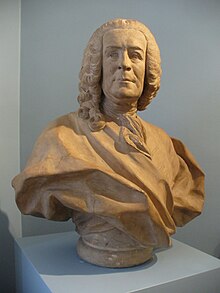Joseph Paris Duverney
| Joseph Paris Duverney | |
|---|---|

Bust of Pâris-Duverney in musée de Brunoy
|
|
| Born | 10 April 1684 Moirans, France |
| Died | 17 July 1770 (aged 86) Paris, France |
| Occupation | Banker |
Joseph Pâris dit Duverney or Joseph Pâris Du Verney (10 April 1684 – 17 July 1770) (the suffix "Duverney" comes from an estate at Moirans which belonged to his family) was a French financier.
The third of four brothers, joined them in Paris at the age of seventeen and, after a brief period in the Gardes Françaises he followed the example of his elder brothers by going into business provisioning the army. He served as Quartermaster at Mons, then as Director General of Provisions from 1706-9. He became Munitioner-General in 1710, acquired the tax farm for tobacco in 1714 and, together with his brothers, bought into the ferme générale in 1718. He was involved in a project to develop Louisiana. The Pâris brothers obtained a concession not far from New Orleans and established a plantation there. Because of their criticisms of John Law, the brothers were exile to the Dauphiné in June 1720, just a month before the bursting of the Mississippi Bubble. Supported by Antoine Crozat and Samuel Bernard, two other former financiers of Louis XIV, the brothers undertook to manage the consequences of the collapse of Law system. In particular, Pâris-Duverney directed l'opération du visa - the systematic management of payments to bondholders.
In December 1721, he acquired the lordship of Plaisance (near Nogent) and undertook the reconstruction of the château there, turning it into a residence designed according to his own specifications.
Under the ministry of the Duke of Bourbon, in which he served as principal secretary, he enjoyed the support of the Marquise de Prie and proposed a new tax, the ‘cinquantième’ (5% levy) as well as a number of measures which provoked the opposition of both the Parlement of Paris and the nobility. His growing unpopularity led to an assassination attempt on him, followed by a second fall from grace in 1726 when he was the subject of a lettre de cachet. He spent 18 months in the Bastille, was released in 1728, and retired to his estates in Champagne, where he entered into a long correspondence with Voltaire.
...
Wikipedia
